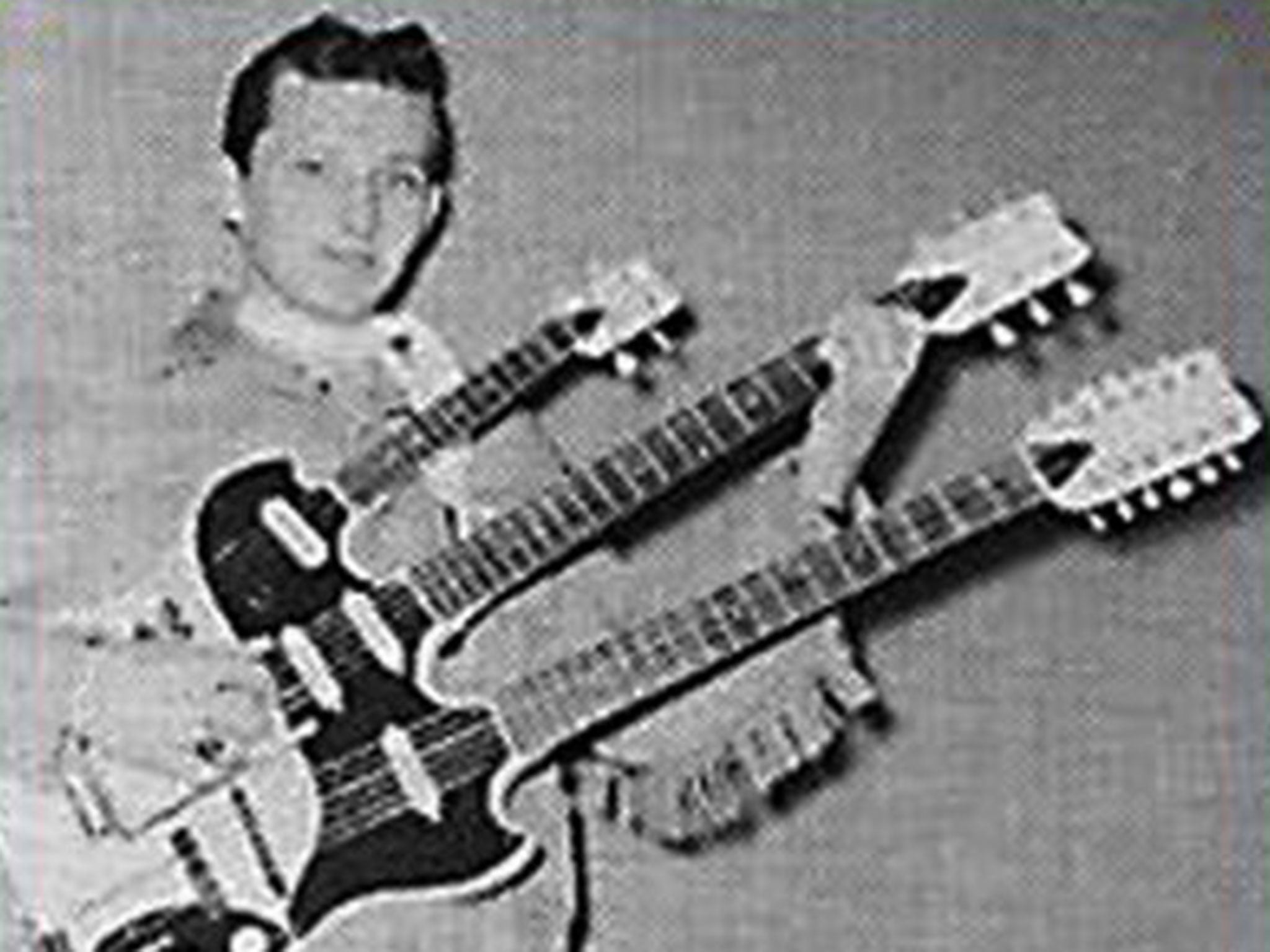Johnny Meeks: Guitarist and songwriter who contributed much to the exciting and exuberant style of Gene Vincent
Meeks was born into a blue collar family in Gaffney, South Carolina in 1937 but was raised in Laurens, SC

Some of the most exciting rock’n’roll records were made by Gene Vincent and the Blue Caps, and a key part of their exuberance came from the lead guitarist, first Cliff Gallup and then Johnny Meeks.
Meeks was born into a blue collar family in Gaffney, South Carolina in 1937 but raised in Laurens, SC. In his teens he played country music for the Circle E Ranch Boys in Greenville. He had watched Gene Vincent’s rise with “Be-Bop-A-Lula” in April 1956 and his friend, Paul Peek, joined Vincent on rhythm guitar and backing vocals in September.
Cliff Gallup was a fine guitarist but was uncomfortable with fame and a life on the road, and when he left the following March, Peek recommended Meeks. Vincent went to Greenville to check him out and found him playing a three-necked guitar – an acoustic, six-string and 12-string all in one instrument made by his friend, Peewee Melton. Vincent hired him and liked to tell people, “I got a guitarist with three necks.”
Meeks, however, switched to a standard Gretsch and then accepted a promotional gift of a Fender Stratocaster. He can be seen with Vincent in the film Hot Rod Gang, where they perform “Baby Blue”. The rebellious and argumentative Vincent encouraged bad behaviour in others. They drank heavily, drove wildly, trashed hotel rooms and shared groupies. Meeks’ doctor prescribed Dexedrine to increase his stamina but he didn’t need it and would sell the pills to Vincent.
One night in Rochester, Minnesota, Meeks left the touring party to clear his head. He bought a Coke at a service station shortly before the attendant was murdered. Meeks was arrested, and though it was soon established that he had nothing to do with it, he wore his arrest like a badge of honour.
Meeks wrote a definitive rock’n’roll song in “Say Mama”, and he told me, “The tune had been bouncing around in my head for two or three days and then I got together with a buddy of mine and we put words to it at three o’clock in the morning. I showed it to Gene and he said, ‘Fine, let’s cut it.’ I wanted a sax on there and as it was my song, so to speak, Gene went along with that.”
Meeks played on their US hit “Lotta Lovin’” as well as “Dance to the Bop”, “Frankie and Johnny”, “Summertime” and “Git It”, which featured Eddie Cochran on bass vocal. Meeks worked with Cochran on the Four Dots’ single, “Don’t Wake Up The Kids”.
The strain of touring took its toll, and by October 1958 Meeks felt it was time to go. “Gene’s band was breaking up,” he recalled. We’d been through several Blue Caps and I was one of the last remaining members and it was tiring. We recorded for Capitol in Hollywood and as I didn’t want to return to South Carolina, I stayed in Hollywood. Some friends offered me a job in a night club. I stayed there on and off for 30 years, playing night clubs and having a ball.”
Meeks joined the instrumental band the Champs, writing and recording “Red Eye” with them in 1960 and then working with Jimmy Clanton, who cut the original version of “Venus in Blue Jeans”. He often worked in a club band with the steel guitarist, Red Rhodes. Occasionally Vincent would invite Rhodes to join him in the UK but he knew it would be mayhem and declined.
In 1969 Vincent worked with both Meeks and Rhodes on his album, I’m Back And I’m Proud, which was produced by Kim Fowley for John Peel’s Dandelion label. The problems in making that record merits a book in its own right but, according to Meeks, “Gene was singing as good as ever.”
Vincent was to die two years later from a ruptured stomach ulcer in Simi Valley, California. Meeks said, “I was only two or three miles from Gene as I was playing a night club very close to there. Had I known he was in trouble. I could have been there within five minutes. I would have certainly tried to help him.”
Meeks worked for both Michael Nesmith of the Monkees and Merle Haggard. The Blue Caps often reformed and invited Graham Fenton from Matchbox to be their lead singer. They made an album in Wales, Blue Caps Unleashed (1982), which included a previously unrecorded Meeks and Vincent composition, “I Lost An Angel”. Meeks recorded “Say Mama” with his own band, Johnny Meeks and the Hypnotics. All in all he had had a good life, “I have been able to do other things. I don’t practise and I don’t rehearse. I make my living in music but I don’t put too much effort into it.”
SPENCER LEIGH
Johnny T Meeks, guitarist: born Gaffney, South Carolina 16 April 1937; married (one daughter); died Jonesboro, Arkansas 30 July 2015.
Subscribe to Independent Premium to bookmark this article
Want to bookmark your favourite articles and stories to read or reference later? Start your Independent Premium subscription today.

Join our commenting forum
Join thought-provoking conversations, follow other Independent readers and see their replies